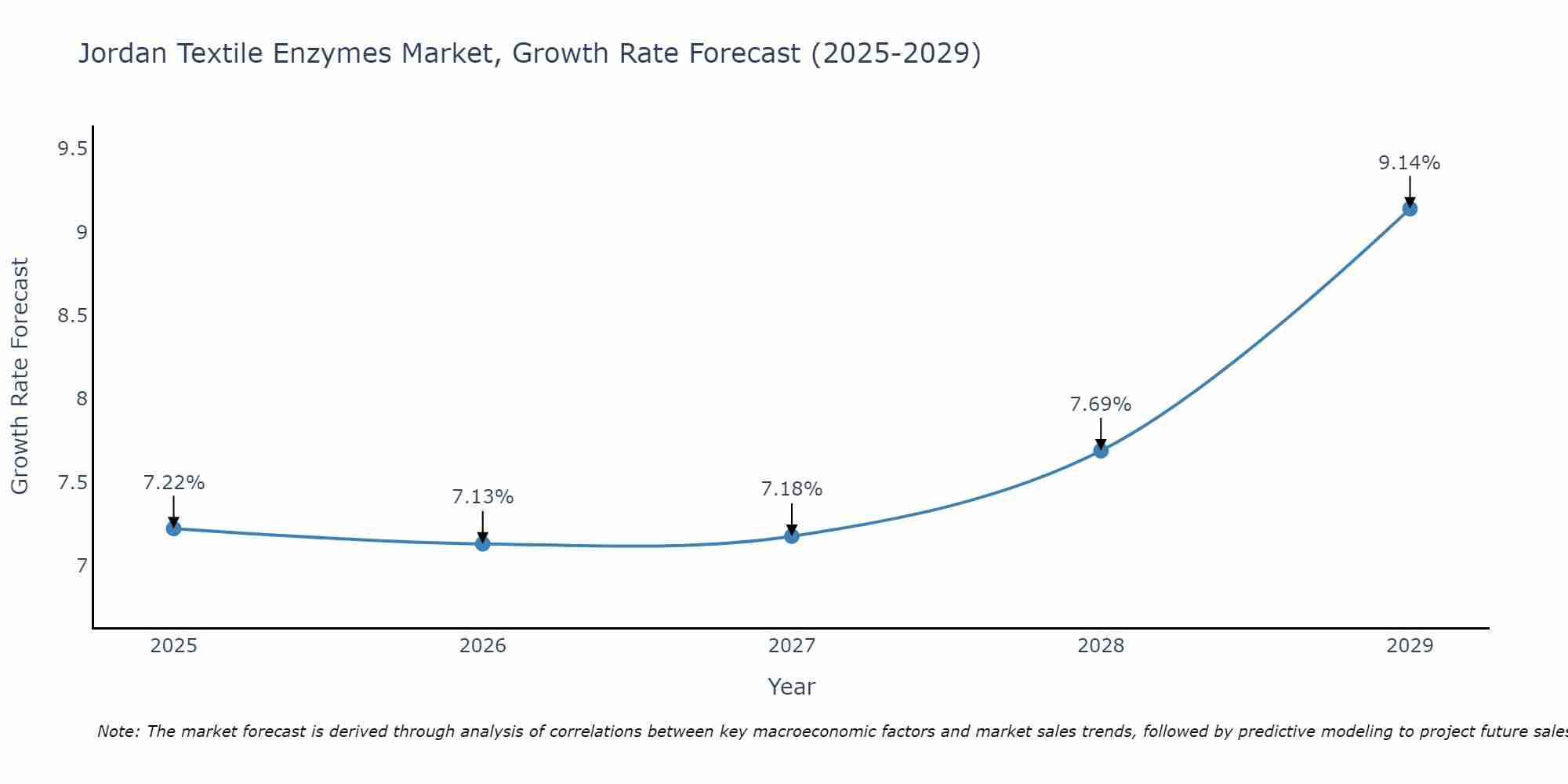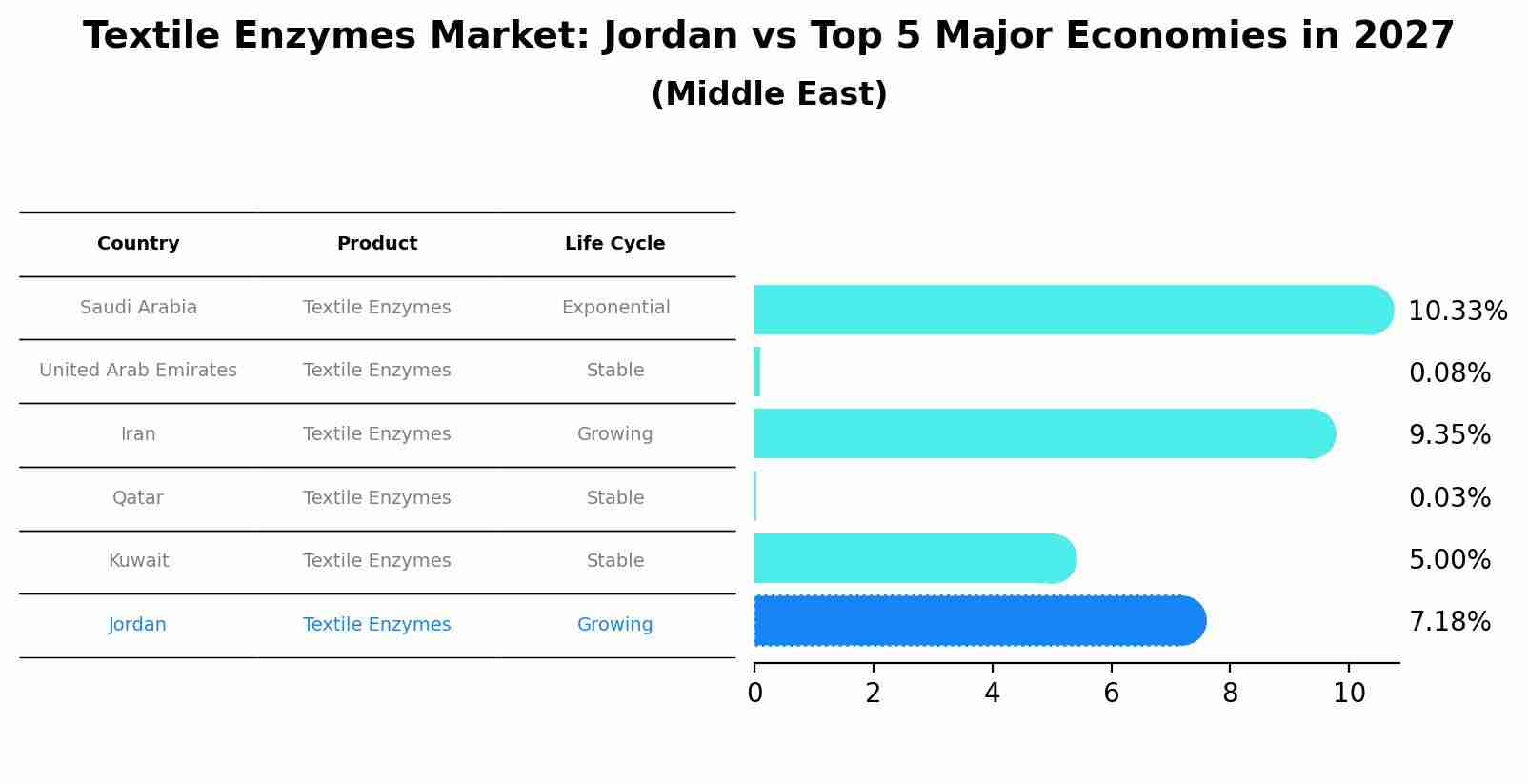Jordan Textile Enzymes Market Outlook | Growth, Share, Analysis, Industry, COVID-19 IMPACT, Forecast, Size, Revenue, Companies, Trends & Value
| Product Code: ETC094085 | Publication Date: Jun 2021 | Updated Date: Jun 2025 | Product Type: Report | |
| Publisher: 6Wresearch | Author: Bhawna Singh | No. of Pages: 70 | No. of Figures: 35 | No. of Tables: 5 |
Jordan Textile Enzymes Market Size Growth Rate
The Jordan Textile Enzymes Market is projected to witness mixed growth rate patterns during 2025 to 2029. Commencing at 7.22% in 2025, growth builds up to 9.14% by 2029.

Textile Enzymes Market: Jordan vs Top 5 Major Economies in 2027 (Middle East)
By 2027, the Textile Enzymes market in Jordan is anticipated to reach a growth rate of 7.18%, as part of an increasingly competitive Middle East region, where Saudi Arabia remains at the forefront, supported by United Arab Emirates, Iran, Qatar and Kuwait, driving innovations and market adoption across sectors.

Jordan Textile Enzymes Market Overview
The Jordan Textile Enzymes Market is witnessing steady growth driven by increasing demand for eco-friendly and sustainable textile production processes. Textile enzymes are widely used in the industry for various applications such as desizing, bio-polishing, and finishing. The market is primarily driven by the growing awareness among consumers about the environmental impact of traditional textile processing methods. Enzymes offer several advantages including reduced water and energy consumption, as well as improved fabric quality. Key players in the Jordanian textile enzyme market include Novozymes, Genencor, and AB Enzymes. With the government`s focus on promoting sustainable practices in the textile industry, the market is expected to continue its growth trajectory in the coming years.
Jordan Textile Enzymes Market Trends
The Jordan Textile Enzymes Market is experiencing a growing demand for eco-friendly and sustainable solutions, leading to a shift towards enzymatic processes in the textile industry. Enzymes are being increasingly used in various textile applications such as desizing, bio-polishing, and denim finishing due to their ability to reduce water, energy, and chemical consumption while enhancing product quality. Additionally, there is a rising interest in specialty enzymes tailored for specific textile processes, driving innovation and customization in the market. Companies are focusing on developing enzyme solutions that are efficient, cost-effective, and meet the evolving sustainability requirements of the textile industry in Jordan. Overall, the market is witnessing a transition towards greener technologies and solutions, with enzymes playing a crucial role in driving this transformation.
Jordan Textile Enzymes Market Challenges
In the Jordan Textile Enzymes Market, some challenges faced include limited awareness and understanding of the benefits of using enzymes in textile processing among manufacturers. This lack of knowledge often leads to hesitancy in adopting enzyme technology, thereby hindering market growth. Additionally, there may be concerns regarding the initial investment required to implement enzyme treatments in textile production processes. Furthermore, the availability of skilled personnel with expertise in enzyme application and the need for continuous research and development to improve enzyme formulations for specific textile applications are other challenges in the market. Overcoming these obstacles will require education and training programs, strategic partnerships between enzyme suppliers and textile manufacturers, as well as ongoing innovation in enzyme technology tailored to the needs of the Jordanian textile industry.
Jordan Textile Enzymes Market Investment Opportunities
The Jordan Textile Enzymes Market presents promising investment opportunities due to the increasing demand for sustainable and eco-friendly solutions in the textile industry. Enzymes are being increasingly utilized in various textile processes such as desizing, bleaching, and finishing, as they offer cost-effective and environmentally friendly alternatives to traditional chemical processes. Investors can explore opportunities in enzyme manufacturing companies, research and development of innovative enzyme solutions tailored to the textile industry, or partnerships with textile manufacturers looking to adopt enzyme technology. With growing awareness of environmental sustainability and stringent regulations on chemical usage in textile production, investing in the Jordan Textile Enzymes Market can offer long-term growth potential and contribute to the shift towards more sustainable practices in the industry.
Jordan Textile Enzymes Market Government Policy
The government of Jordan has implemented several policies related to the textile enzymes market to promote sustainable growth and development. These policies include providing financial incentives and subsidies to encourage the use of eco-friendly enzymes in textile production processes, promoting research and development activities to enhance the efficiency and effectiveness of enzyme technologies, and enforcing strict regulations to ensure the safety and quality of enzyme products used in the textile industry. Additionally, the government has been actively supporting initiatives to increase awareness among textile manufacturers about the benefits of using enzymes in their production processes and encouraging collaborations between industry stakeholders and research institutions to drive innovation and competitiveness in the market. Overall, these policies aim to foster a more sustainable and environmentally friendly textile industry in Jordan.
Jordan Textile Enzymes Market Future Outlook
The future outlook for the Jordan Textile Enzymes Market appears promising, driven by increasing awareness about sustainable textile production practices and the growing demand for eco-friendly solutions. Enzymes are gaining traction in the textile industry for their ability to improve process efficiency, reduce energy consumption, and minimize environmental impact. With the government`s initiatives to promote sustainable practices and the rising consumer preference for green products, the market is expected to witness steady growth in the coming years. Manufacturers are likely to focus on developing advanced enzyme formulations tailored to the specific needs of textile processing, further fueling market expansion. Overall, the Jordan Textile Enzymes Market is poised for growth as the industry embraces sustainable technologies and practices.
Key Highlights of the Report:
- Jordan Textile Enzymes Market Outlook
- Market Size of Jordan Textile Enzymes Market, 2021
- Forecast of Jordan Textile Enzymes Market, 2027
- Historical Data and Forecast of Jordan Textile Enzymes Revenues & Volume for the Period 2018 - 2027
- Jordan Textile Enzymes Market Trend Evolution
- Jordan Textile Enzymes Market Drivers and Challenges
- Jordan Textile Enzymes Price Trends
- Jordan Textile Enzymes Porter's Five Forces
- Jordan Textile Enzymes Industry Life Cycle
- Historical Data and Forecast of Jordan Textile Enzymes Market Revenues & Volume By Type for the Period 2018 - 2027
- Historical Data and Forecast of Jordan Textile Enzymes Market Revenues & Volume By Cellulase for the Period 2018 - 2027
- Historical Data and Forecast of Jordan Textile Enzymes Market Revenues & Volume By Amylase for the Period 2018 - 2027
- Historical Data and Forecast of Jordan Textile Enzymes Market Revenues & Volume By Catalase for the Period 2018 - 2027
- Historical Data and Forecast of Jordan Textile Enzymes Market Revenues & Volume By Pectinase for the Period 2018 - 2027
- Historical Data and Forecast of Jordan Textile Enzymes Market Revenues & Volume By Laccase for the Period 2018 - 2027
- Historical Data and Forecast of Jordan Textile Enzymes Market Revenues & Volume By Others for the Period 2018 - 2027
- Historical Data and Forecast of Jordan Textile Enzymes Market Revenues & Volume By Application for the Period 2018 - 2027
- Historical Data and Forecast of Jordan Textile Enzymes Market Revenues & Volume By Bio-polishing for the Period 2018 - 2027
- Historical Data and Forecast of Jordan Textile Enzymes Market Revenues & Volume By Desizing for the Period 2018 - 2027
- Historical Data and Forecast of Jordan Textile Enzymes Market Revenues & Volume By Enzymatic Bleaching for the Period 2018 - 2027
- Historical Data and Forecast of Jordan Textile Enzymes Market Revenues & Volume By Bioscouring for the Period 2018 - 2027
- Historical Data and Forecast of Jordan Textile Enzymes Market Revenues & Volume By Others for the Period 2018 - 2027
- Jordan Textile Enzymes Import Export Trade Statistics
- Market Opportunity Assessment By Type
- Market Opportunity Assessment By Application
- Jordan Textile Enzymes Top Companies Market Share
- Jordan Textile Enzymes Competitive Benchmarking By Technical and Operational Parameters
- Jordan Textile Enzymes Company Profiles
- Jordan Textile Enzymes Key Strategic Recommendations
Frequently Asked Questions About the Market Study (FAQs):
- Single User License$ 1,995
- Department License$ 2,400
- Site License$ 3,120
- Global License$ 3,795
Search
Thought Leadership and Analyst Meet
Our Clients
Related Reports
- Canada Oil and Gas Market (2026-2032) | Share, Segmentation, Value, Industry, Trends, Forecast, Analysis, Size & Revenue, Growth, Competitive Landscape, Outlook, Companies
- Germany Breakfast Food Market (2026-2032) | Industry, Share, Growth, Size, Companies, Value, Analysis, Revenue, Trends, Forecast & Outlook
- Australia Briquette Market (2025-2031) | Growth, Size, Revenue, Forecast, Analysis, Trends, Value, Share, Industry & Companies
- Vietnam System Integrator Market (2025-2031) | Size, Companies, Analysis, Industry, Value, Forecast, Growth, Trends, Revenue & Share
- ASEAN and Thailand Brain Health Supplements Market (2025-2031) | Strategy, Consumer Insights, Analysis, Investment Trends, Opportunities, Growth, Size, Share, Industry, Revenue, Segments, Value, Segmentation, Supply, Forecast, Restraints, Outlook, Competition, Drivers, Trends, Demand, Pricing Analysis, Competitive, Strategic Insights, Companies, Challenges
- ASEAN Bearings Market (2025-2031) | Strategy, Consumer Insights, Analysis, Investment Trends, Opportunities, Growth, Size, Share, Industry, Revenue, Segments, Value, Segmentation, Supply, Forecast, Restraints, Outlook, Competition, Drivers, Trends, Demand, Pricing Analysis, Competitive, Strategic Insights, Companies, Challenges
- Europe Flooring Market (2025-2031) | Outlook, Share, Industry, Trends, Forecast, Companies, Revenue, Size, Analysis, Growth & Value
- Saudi Arabia Manlift Market (2025-2031) | Outlook, Size, Growth, Trends, Companies, Industry, Revenue, Value, Share, Forecast & Analysis
- Uganda Excavator, Crane, and Wheel Loaders Market (2025-2031) | Strategy, Consumer Insights, Analysis, Investment Trends, Opportunities, Growth, Size, Share, Industry, Revenue, Segments, Value, Segmentation, Supply, Forecast, Restraints, Outlook, Competition, Drivers, Trends, Demand, Pricing Analysis, Competitive, Strategic Insights, Companies, Challenges
- Rwanda Excavator, Crane, and Wheel Loaders Market (2025-2031) | Strategy, Consumer Insights, Analysis, Investment Trends, Opportunities, Growth, Size, Share, Industry, Revenue, Segments, Value, Segmentation, Supply, Forecast, Restraints, Outlook, Competition, Drivers, Trends, Demand, Pricing Analysis, Competitive, Strategic Insights, Companies, Challenges
Industry Events and Analyst Meet
Whitepaper
- Middle East & Africa Commercial Security Market Click here to view more.
- Middle East & Africa Fire Safety Systems & Equipment Market Click here to view more.
- GCC Drone Market Click here to view more.
- Middle East Lighting Fixture Market Click here to view more.
- GCC Physical & Perimeter Security Market Click here to view more.
6WResearch In News
- Doha a strategic location for EV manufacturing hub: IPA Qatar
- Demand for luxury TVs surging in the GCC, says Samsung
- Empowering Growth: The Thriving Journey of Bangladesh’s Cable Industry
- Demand for luxury TVs surging in the GCC, says Samsung
- Video call with a traditional healer? Once unthinkable, it’s now common in South Africa
- Intelligent Buildings To Smooth GCC’s Path To Net Zero


















